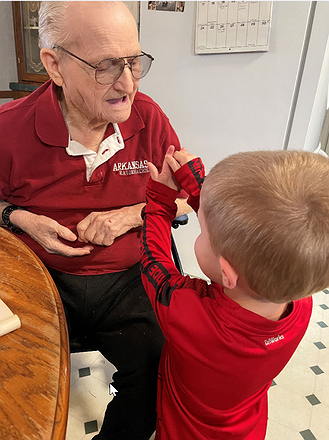Caregivers sought for veteran medical foster program
CAROLYN BOSTICK | Hagadone News Network | UPDATED 8 months AGO
Carolyn Bostick has worked for the Coeur d’Alene Press since June 2023. She covers Shoshone County and Coeur d'Alene. Carolyn previously worked in Utica, New York at the Observer-Dispatch for almost seven years before briefly working at The Inquirer and Mirror in Nantucket, Massachusetts. Since she moved to the Pacific Northwest from upstate New York in 2021, she's performed with the Spokane Shakespeare Society for three summers. | October 11, 2024 1:00 AM
Instead of being in a nursing home or rehabilitation center, veterans in North Idaho may soon get the option to stay in a caregiver's home.
Regional Veterans Affairs officials are looking to start a North Idaho medical foster care program, the first of its kind in the area.
The medical foster home program currently has more than 700 veterans enrolled across the U.S., with about 500 caregivers.
As coordinator for the program, Jamie Pillers is actively recruiting caregivers willing to become part of the program in the region.
“It is an important initiative that offers an alternative to nursing home care for veterans who need full-time care, but prefer to live in a more personal home-like setting,” Pillers said.
The regional VA office in Spokane is searching for community support to connect with potential caregivers.
The program is an alternative to nursing homes for veterans who can no longer live independently but prefer a home setting. Veterans need to be enrolled in services through the hospital.
Veterans are paired with caregivers in the community willing to open their homes to provide 24-hour supervision and assistance. The veterans will receive comprehensive primary care through the VA’s interdisciplinary team, Home Based Primary Care.
The program requires caregivers to have previous experience, whether formal or informal and they will need to have a backup respite caregiver. After screenings and background checks, they will undergo training to be certified through the VA and its healthcare partnerships.
Caregivers are regulated to host a maximum of three veterans in their home so they can provide focused care.
A physician, a psychologist and a nurse are part of the home health care services provided to veterans in their home as part of the program.
The medical foster program has been in existence since 1999 as a pilot program, but Pillers noted that it didn’t get much attention until the early 2000s with the Iraq War.
“A lot of the younger veterans were coming home, but they needed a medical rehabilitation place to go to and they didn’t want to go to a traditional nursing home setting for rehabilitation,” Pillers said.
When an influx of Vietnam and WWII veterans began needing long-term care, many echoed the wish to not live in a care facility, which led to greater adoption of medical foster care.
The cost for veterans to live in a medical foster home is significantly lower than traditional care facilities and is paid by the veteran. Costs of the foster home vary and are largely dependent on how much daily assistance is required from caregivers.
The program is in development or operational at 156 VA sites across 48 states and the VA intends to reach all VA medical centers by 2025.
Pillers asked for interested parties to reach out to learn more about the program and how they can help North Idaho veterans find “the care they deserve in a safe and supporting environment.”
For more information about medical foster care for veterans, call 509-230-9357 or email jamie.pillers@va.gov.
ARTICLES BY CAROLYN BOSTICK

Harvest Meadows housing development measure denied
Developers sought to add seven homes to project
An application for the Harvest Meadows planned unit development and subdivision that would add seven single-family homes to the original 85 planned for the development tied by failing Tuesday night, three to three. Commissioners Vicky Jo Carey, Kibbee Walton, Ross Schlotthauer voted yes and Commissioners James Steffensen, Bobby Wilhelm and Chris Schreiber voted no.

Coeur54 golfers show their drive
Raise nearly $50,000
The fruits of the Coeur54 golf tournament resulted in more than just calls of “fore” across three area golf courses. Golfers displayed powerful drives that went beyond just tee strokes and into a drive to help local nonprofits continue their good work in the community for the sixth year of the event.

Summer heat is on its way as wildfire, lack of rain remains major concern
As the bead in the thermometer rises, climatologist Cliff Harris is less worried about the temperature than the lack of precipitation this year. "I'm worried about the fact that we've had so little rain," Harris said. "I do see some rain coming in mid-June, but I don't know how much it's going to be."



